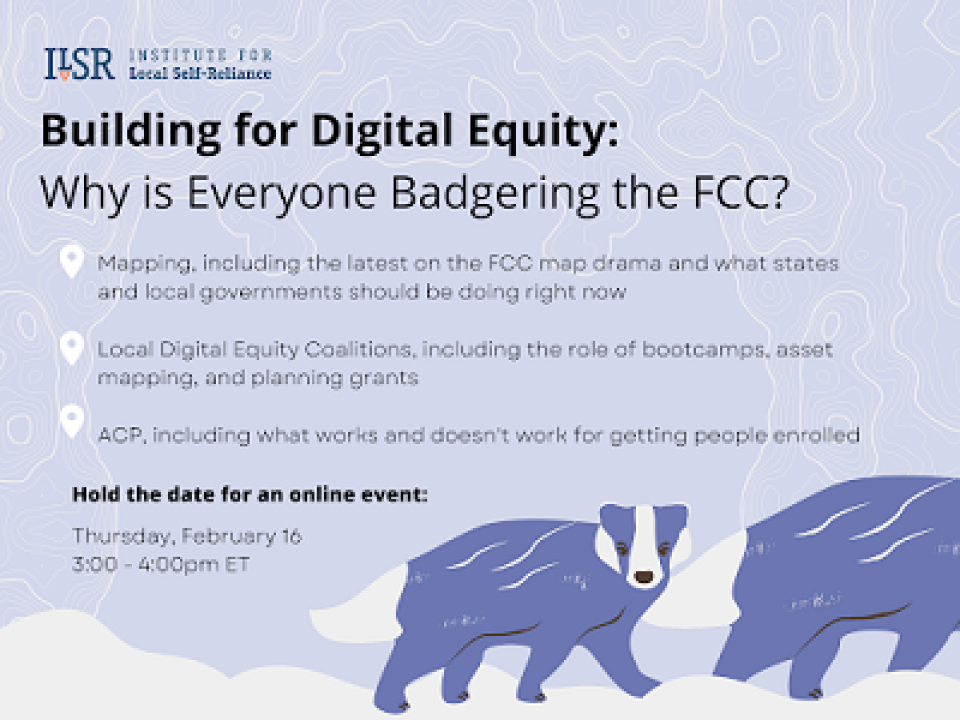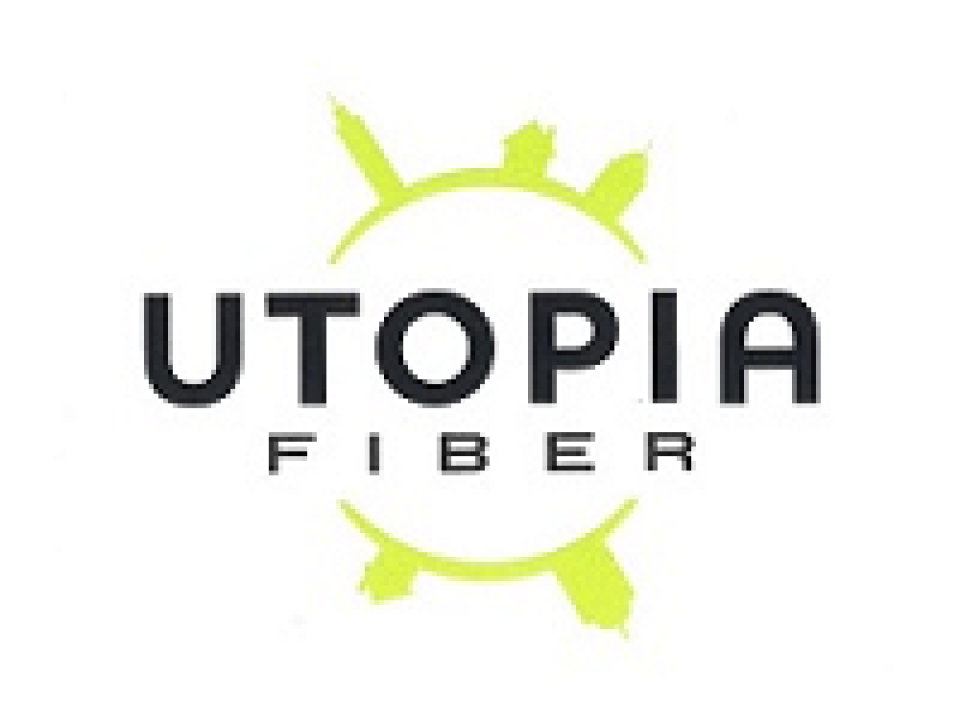
Fast, affordable Internet access for all.

In just over 24 hours our next Building for Digital Equity (#B4DE) event goes live.
Tomorrow, June 7, beginning at 3 pm ET, #B4DE promises to offer engaging examples, practical tools, and nuggets of insight as digital equity advocates across the nation prepare to take advantage of unprecedented federal funds and programs spurred by the Digital Equity Act and bipartisan infrastructure law.
This free event, sponsored once again by UTOPIA Fiber, will be headlined by National Digital Inclusion Alliance (NDIA) Executive Director Angela Siefer. She will offer thoughts on what those working to close the digital divide should be thinking about while setting priorities in this historic moment, as states are developing their digital equity plans and getting ready to receive their share of the $42.5 billion contained in the Infrastructure Investment and Jobs Act (IIJA).
Though seats are filling up fast, there is still time to register here.
The livestream will be available (and later archived) on Facebook, YouTube, Twitter, and LinkedIn, with live viewer questions answered by the panels. We recommend viewing it on YouTube here where the live chat will be most lively.
Co-hosted by NDIA Training & Community Engagement Manager Pamela Rosales and ILSR’s Community Broadband Networks Director Christopher Mitchell, the 75-minute online webinar brings together a variety of front-line experts and digital inclusion practitioners who will share focused, concise lessons-learned and best-practices relevant for those working in both rural communities and urban centers.
Our next Building for Digital Equity (B4DE) event is only weeks away. Have you registered yet?
Sponsored by UTOPIA Fiber, the June 7 virtual gathering will feature engaging debates on the hottest topics in broadband: the upcoming release of BEAD funds, the challenges around mapping, updates on efforts to boost enrollment in the Affordable Connectivity Program (ACP), and the looming implications for both urban and rural communities.
Like B4DE in the past, this event, slated to begin at 3 pm ET on June 7, will be cohosted by Pamela Rosales, from the National Digital Inclusion Alliance (NDIA), and our own Christopher Mitchell, Director of ILSR's Community Broadband Networks Initiative.
Register now for the event here.
As with previous B4DE events, this one will include informative, concise presentations, a series of interactive trivia games, and an introduction to new data tools for those working on the front lines of digital equity. It will all be livestreamed and will be available (and later archived) on Facebook, YouTube, Twitter, and LinkedIn, with live viewer questions answered by the panels.
Building for Digital Equity Podcast Series New Episodes
Meanwhile, be sure to check out our most recent episodes of our Building for Digital Equity podcast, which features short interviews with the people working in the trenches for digital inclusion.
Episode 7 is a discussion with Dwight Thomas, who built the first citywide municipal fiber network in Mont Belvieu, Texas. Thomas goes on talk about the importance of community engagement and how to make sure people can use the network once it is built before explaining his passion for discipleship and sharing knowledge.
As communities across the country are implementing digital equity plans and looking to expand access to high-speed Internet connectivity, the second Building for Digital Equity event (#B4DE) of the year comes weeks ahead of when states will receive their BEAD funds from the bipartisan infrastructure bill.
Save the date and join us June 7 at 3 pm ET for #B4DE! As with previous B4DE events, this will be another virtual gathering that will offer up strategies to help simplify the complexities (and opportunities) of broadband connectivity. This event, sponsored again by UTOPIA Fiber, will focus on ways communities can foster meaningful action and advocacy.
Fresh off their most successful Net Inclusion gathering ever, the National Digital Inclusion Alliance (NDIA) will join ILSR’s Community Broadband Networks (CBN) team for the event as NDIA’s Pamela Rosales will co-host the livestream along with CBN Director Christopher Mitchell.
The 75-minute free event promises to be informative and include a series of fun interactive games. It will also debut a point-counterpoint component that will focus on the pending release of BEAD dollars for both rural and urban areas and the challenges around mapping as states try to determine how to get the biggest bang for the buck.
Register now for the Building for Building for Digital Equity Event.
See our previous B4DE livestreams below:
Digital equity advocates rode into San Antonio, Texas for Net Inclusion 2023 to kick-off the largest gathering of the annual conference to date.
There were nearly 1,000 in attendance at the Henry B. Gonzalez Convention Center in downtown San Antonio for the National Digital Inclusion Alliance (NDIA) marquee gathering. Those on the front lines of bridging the digital divide across the nation came to the three-day conference (Feb 28 to March 2) to network, share lessons, best-practices, and learn from experts as the largest ever federal investment in expanding broadband access is heading to state broadband offices this summer.
Mayor Addresses Attendees, Acknowledges Open Secret
San Antonio Mayor Ron Nirenberg welcomed attendees, noting how his city was a fitting venue for the event.
“It’s no secret San Antonio is one of the most socio-economically segregated cities in the United States,” he said. “And that’s why we have zeroed-in on equity – in our budget, in who gets invited to the table.”
Joining nearly a thousand digital inclusion practitioners, policymakers, advocates, and researchers from across the nation, ILSR’s entire Community Broadband Networks (CBN) team will be in San Antonio, Texas at the end of this month for Net Inclusion 2023.
The three-day event – organized by the National Digital Inclusion Alliance (NDIA) – will run from Feb. 28 to March 2 at the Henry B. Gonzalez Convention Center in San Antonio, Texas and is expected to draw close to 1,000 local, regional, and national leaders on the frontlines of digital equity work in the U.S.
Attendees will feast on a buffet of broadband and digital inclusion subjects and activities with everything from breakout sessions and community site tours to lightning round discussions covering the hottest and most interesting challenges digital equity advocates face in bridging the nation’s digital divide. (Don’t miss the Wednesday night event detailed below that we are hosting!)

The NDIA-hosted event is organized to “support the local digital inclusion community there and to help practitioners nationwide learn from their leadership and ecosystem.”
You can find the schedule here.
It’s not too late to register for our first Building for Digital Equity (#B4DE) livestream event of the year. This Thursday, Feb. 16, from 2-3 pm CST/3-4 pm ET, ILSR’s Community Broadband Networks Initiative will kick off our Building for Digital Equity series.
The focus will be on two of the hottest topics in broadband right now: mapping and the Affordable Connectivity Program (ACP).
Promising to bring more light than heat, co-host Christopher Mitchell, Community Broadband Networks Initiative Director, will be joined by co-host Kim McKinley, Chief Marketing Officer with UTOPIA Fiber – our sponsor for this year’s series. We are calling this one Building for Digital Equity: Why is Everyone Badgering the FCC?
You can register here.

The event will give an overview of the FCC’s new broadband map and make clear what has been confusing and convoluted for those who have been working to fix the multitude of inaccuracies the map contains through the challenge process.
Our expert guests will break down the difference between fabric and location challenges and availability challenges and how those challenges may, or may not, affect how much each state will receive from the $42.5 billion Broadband Equity Access & Deployment (BEAD) program embedded in the bipartisan infrastructure bill.
Our GIS and Data Visualization Specialist Christine Parker will review helpful mapping tools, which will be followed by a Q&A with audience members.
Save the date! ILSR’s Community Broadband Networks team is back for a second season of our Building for Digital Equity series.
You can register now here.
The free online live stream will be held on Feb. 16 from 2-3 pm CST/3-4 pm ET.
We will unpack how local communities are working with their states to challenge the FCC’s broadband maps, bringing together local stakeholders, policy advocates, and GIS and Data Visualization Specialists in one place. We will also cover local organizing for better broadband and the latest on the Affordable Connectivity Program (ACP).
The event, which this year is being sponsored by UTOPIA Fiber, will cover:

Mapping Tools
Organizing Local Digital Equity Coalitions
Affordable Connectivity Program (ACP)
The livestream will be available on Youtube, Twitter, Facebook, LinkedIn, and Twitch, with live viewer questions answered by the panels. Stay tuned for those links here.
On Friday, September 23rd from 1:30-2:30pm CT, join Broadband.Money's latest Ask Me Anything event and pepper ILSR's Christopher Mitchell with your questions. Register here.
He's completely at your disposal for 60 minutes, so bring your questions about publicly owned networks, policy, infrastructure programs, our new ACP Dashboard, recent municipal victories in Holland and monopoly-funded opposition campaigns in Maine, technology deployments, building grassroots support, navigating the current landscape, and whether he thinks the FCC will update its definition of basic broadband before the year 2030. Broadband Breakfast's Drew Clark will host.
The event is being hosted by Broadband.Money, which has been positioning itself as a grant resource for the flood of federal funds coming down the pipeline. Past AMA guests include familiar faces, including Lori Adams, John Windhausen, and Joe Valandra. Jonathan Chambers, Partner at Conexon and recently on the Broadband Bits podcast to talk about mapping, BEAD, and the future of broadband, will have his AMA today, September 9th, if you're interested.
Register for Christopher's AMA session at Broadband.Money here.
AARP Minnesota has taken notice: “broadband infrastructure has not been deployed evenly to communities across the state.”
In an effort to raise awareness about the “good news” of state and federal investments to expand infrastructure and how local leaders and residents can learn how to push for better broadband access in their communities, the Minnesota chapter of the AARP will host a “Critical Access: Broadband Expansion in Minnesota” webinar beginning at 1 p.m. CT Wednesday, Aug. 24.

Our own Christopher Mitchell, Director of Community Broadband Networks with the Institute for Local Self-Reliance, will be a featured speaker for the one-hour event and will be joined by Cathy McLeer, State Director for AARP Minnesota, as well as Lori Vrolson, Executive Director of the Central Minnesota Council on Aging.

McLeer has been with AARP Minnesota since 2005, having first served as the Associate State Director for Communications in the South Dakota State Office, then as a Senior Advisor for the Central Region, before becoming the Minnesota State Director where she has been a powerful advocate on behalf of Minnesota’s 630,000 AARP members.
The Midwest Peering Summit is in Des Moines, Iowa this year on July 26th, with participants able to hear from industry veterans and Internet Exchange (IX) operators on a range of topics, from improving efficiencies and performance, to last-mile deployments, to distributed architecture.
The event begins at 11am, with panels scattered throughout the day, and a reception at the end of the day.
The event will feature speakers from Internet Exchange carriers of a variety of sizes from from all over the midwestt, nationally and globally, as well as vendors and Internet Service Providers (ISPs). Familiar names include MICE, Hurricane Electric, South Front Networks, US Intenet, Vatnage Point, and many more.
See the full list of speakers and participants here, and register for the Midwest Peering Summit here.
Check out the full schedule here.